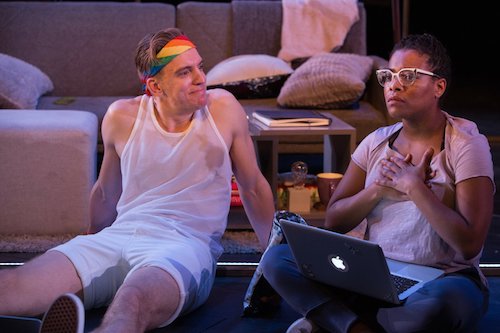 Every Day She Rose is compelling and complex, now playing in Toronto
Every Day She Rose is compelling and complex, now playing in Toronto
Three years ago, Black Lives Matter Toronto was the Grand Marshall group of Toronto Pride, and used the opportunity to stop the parade and present to then-ED of Pride Toronto Mathieu Chantelois a list of demands relating to Black inclusion and centering in Pride. The surrounding controversy, which still feels fresh and difficult, is the subject of Nick Green and Andrea Scott’s new play, Every Day She Rose (a Nightwood production playing at Buddies in Bad Times Theatre).
The play frames this iconic and controversial protest action, and the fallout as community members disagreed about what it meant, whether it should have happened, and how to move forward through the effect on the long-time friendship of characters Mark (a gay white man, played by Adrian Shepherd-Gawinski) and Cathy-Ann (a straight Black woman, played by Monice Peter). The play starts in a rainbow cloud of hope and ends…well, it ends elsewhere.
As the play unfurls, a play-within-a-play emerges — the dramatization of the playwrights’ (Nick Green and Andrea Scott) process and disagreements in the making of the work. At a pivotal point, just as the first movement of the play is coming to a head, the scene and tone change as we’re thrown into Playwright Time and a tense interaction of the play is rewritten several times. I instantly thought of the last time I’d found that device effective and interesting, on the same stage, with Black Boys, directed by Green’s lemonTree collaborator Jonathan Seinen, also digging in to issues of racism and representation. I found it worked well this time too, and I doubly appreciated the invocation of the human desire to rewrite important conversations until we feel we’ve expressed ourselves the most correctly.
Shepherd-Gawinski and Peter both find a balance of different-ness in their characters as they swap back and forth between playing fictional characters and the playwrights who make them. Co-directors Sedina Fiati and Andrea Donaldson keep the tension high and well-tuned as Every Day She Rose asks more and more complex questions: whose experience should be centered? Whose fears are valid? Is Pride a celebration or a site of protest? How do we hold and validate each others’ trauma? What is the responsibility of an ally or co-resistor to their best friend? Of a collaborator to their collaborator? The characters hold it all.
Praise is also due to lighting designer Rebecca Picherack and sound designer Cosette Pin. I am, by constitution, generally of the opinion that any given show would be fine with about half as many light and sound cues, but Every Day She Rose hasn’t got even one superfluous cue — they’re all necessary and excellently done. The entire piece is really a paean to the confident line, in all senses. Nothing is wasted, not in spectacle or emotion, and so the 75-minute length can command every scrap of the theatergoer’s attention.
My one quibble: I would have expected a mention of the long and invaluable work of Blockorama/Blackness YES in this piece, as that estimable collective has been the site of Black liberation and justice work at Toronto’s Pride for over two decades, as well as holding down the only specifically LGBT2Q space I know of at Caribana.
This is the issue, clearly, with work that deals with current events — how to shape the story in front of people who lived through it in a way that amplifies and troubles our memories? Every Day She Rose does it, compellingly.
Details
- Every Day She Rose plays at Buddies in Bad Times Theatre (12 Alexander St.) until December 8th, 2019.
- Shows run Tuesday-Saturday at 8:00PM, with Saturday-Sunday 2:30PM matinees.
- Tickets are $15-40 and can be purchased online, in person at the theatre Box Office, or by calling 416-975-8555. See website for rush ticket and PWYC information.
photo of Adrian Shepherd-Gawinski and Monice Peter by Cylla von Tiedemann
